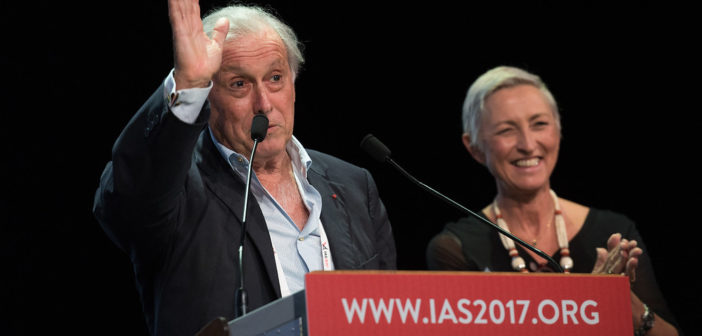The 9th IAS Conference on HIV Science (IAS 2017) successful drew to a close on Wednesday in the city of light and love-Paris. HIV scientists and activists will next head to Amsterdam, Netherlands for the 22nd International AIDS Conference (AIDS 2018). AIDS 2018 will be held on 23-28 July 2018 at the Amsterdam RAI and is expected to bring together some 18,000 participants from around the world.
This is the second time that Amsterdam will host the International AIDS Conference (IAC). The 8th International AIDS Conference was held in the Dutch capital in 1992. The last IAC to be held in Europe was AIDS 2010 in Vienna. The International AIDS Conference was previously held in Melbourne, Australia in 2014. The next conference (AIDS 2016) will be held in Durban, South Africa in July 2016.
The cure for HIV is still very much on but scientists are getting closer. Delegates and leaders at the event enjoined the world to continue to invest in the research and treatment of HIV. Below is the official statement from the 9th IAS Conference on HIV Science, Paris 2017:
Scientific knowledge is the backbone of the HIV response. Over the past 30 years, scientific research has shaped and influenced our understanding and management of HIV and has pointed continually to better ways to reduce or prevent HIV-related illnesses, improve lives for people living with HIV and prevent new infections. Science drives the HIV response. Yet our extraordinary scientific progress against HIV and our ability to address all of the scientific challenges still before us are threatened by a weakening resolve to fund HIV science.
We cannot achieve ambitious global goals, provide life-long treatment to the 37 million people living with HIV and reduce the epidemic without an unfaltering commitment to research. Progress in HIV science has far-reaching synergistic effects across public health, informing and supporting the response to other disease areas. Political commitment to sustained and predictable investment in a robust HIV science agenda must be strengthened in each of these areas to ensure that scientific progress against the epidemic is maximized and that gains are not lost:

9th IAS Conference on HIV Science (IAS 2017) Paris, France. Copyright: Marcus Rose/IAS Photo shows: Rapporteur and Closing Session (WEPL02). Track B rapporteur summary Paula Munderi, MRC/UVRI Uganda Research Unit on AIDS, Uganda
Understanding HIV and its interactions with its host at the most fundamental level requires continuing investment in basic science. Current research priorities include the analysis of the molecular and cellular mechanisms of HIV persistence and viral control. To enhance research efforts towards an HIV cure, animal models and promising new technologies must be funded. Synergistic approaches with cancer, chronic and infectious diseases research must be promoted.
Controlling the global epidemic requires a vaccine and an ongoing and consistent commitment to investigating new approaches to vaccine development for both prophylactic and therapeutic use. Research efforts must include the characterization of different cellular and humoral immune responses to be harnessed in the development of preventive vaccine and immunotherapeutic strategies.
structural barriers should focus on improving access to diversified prevention tools, including pre-exposure prophylaxis (PrEP), for people most vulnerable to HIV infection. Prevention research must continue to support the development and scale up of combination prevention, notably for key populations (men who have sex with men, people who inject drugs, sex workers, transgender people), migrants and the younger generation with a gender-sensitive approach. Research priorities in the humanities and social sciences must address stigma and discrimination and identify tailored approaches to reduce the drivers of the epidemic, including homophobia, sexism and xenophobia.
Beyond the laboratory and clinical trial setting, investments that better explore economics and financing are essential to supporting a sustained response and the creation of innovative financing models. Research must continue to inform thinking on pricing models for HIV diagnostics and medicines, as well as treatments for co-infections, that are modified in particular for low- and middle-income countries and take into consideration the expanded role of generics and bio-equivalents. Political and economic sciences must focus on existing financing gaps and work towards models that expand universal health coverage.
The HIV epidemic is far from over. Expanding the evidence base to guide policy and programme decisions is a key component in addressing critical research gaps. Multi-disciplinary approaches and research programmes adapted to a range of social and cultural contexts must be allowed to flourish; participatory and community-based research must be strengthened; and the meaningful involvement of key populations and people living with HIV in shaping research priorities must remain an unwavering principle.
HIV science matters. Ending the epidemic requires the continued contribution of and investment in science.






